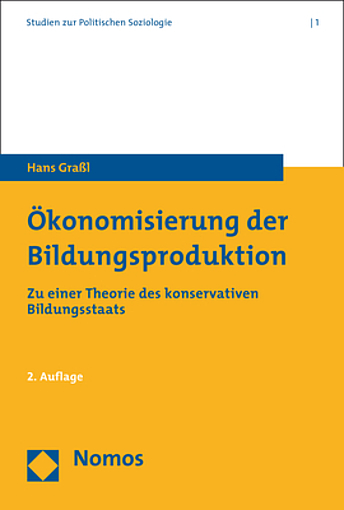englischIn this study, the author sheds light on the debate about economisation in education from a sociological perspective and answers, among others, the following questions: What does the popular term ‘economisation’ encapsulate? What economic and social forces are driving cuts in spending on education and in educational output? Which forms of social coordination are being suppressed by the advancement of market mechanisms in the education system? Who is involved in the financing and provision of educational services? How does the state, the key provider of education, change during the course of economisation? Although the state has a decisive influence on the distribution of chances in life and on social inequality, the question of the organisation of educational output in Germany is traditionally not addressed from a sociopolitical perspective, a failing that has to be remedied. From an international comparative perspective, Hans Graßl makes sense of the structures of Germany’s conservative state education system, which differs considerably from the liberal and social democratic state education systems found, for example, in the USA and Sweden respectively.
Der Autor bringt aus soziologischer Perspektive Licht in die Debatten über die Ökonomisierung der Bildung und beantwortet unter anderem folgende Fragen: Was verbirgt sich hinter dem populären Schlagwort „Ökonomisierung“? Welche wirtschaftlichen und sozialen Kräfte treiben die Ökonomisierung der Bildung und der Bildungsproduktion voran? Welche Formen der sozialen Koordination werden durch das Vordringen des Marktmechanismus im Bildungssystem verdrängt? Welche Akteure sind an der Finanzierung und Bereitstellung von Bildungsleistungen beteiligt? Wie verändert sich im Zuge der Ökonomisierung der wichtigste Bildungsproduzent: der Bildungsstaat? Obwohl der Bildungsstaat die Verteilung von Lebenschancen und die soziale Ungleichheit entscheidend mitbestimmt, wird die Frage nach der Organisation der Bildungsproduktion in Deutschland traditionell nicht als sozialpolitische Frage thematisiert. Ein Defizit, das überwunden werden muss. Hans Graßl entschlüsselt in international vergleichender Perspektive die Strukturen des konservativen Bildungsstaats in Deutschland, der sich von liberalen (z.B. USA) und sozialdemokratischen Bildungsstaaten (z.B. Schweden) wesentlich unterscheidet.


